June 23, 2025 | 17:28 GMT +7
June 23, 2025 | 17:28 GMT +7
Hotline: 0913.378.918
June 23, 2025 | 17:28 GMT +7
Hotline: 0913.378.918
In honor of the one-year anniversary of the Comprehensive Strategic Partnership, a U.S. trade delegation of 100 participants, including 35 U.S. business representatives, officials from nine State departments of agriculture and representatives from 21 USDA cooperators.
At the event, Vietnam Agriculture News spoke with a representative from California. Karen Ross is currently serving as the Secretary of the California Department of Food and Agriculture (CDFA), a role for which Governor Newsom praised her extensive leadership experience in agricultural issues at the national, international, and state levels. Her expertise spans environmental stewardship, climate change adaptation, and trade.
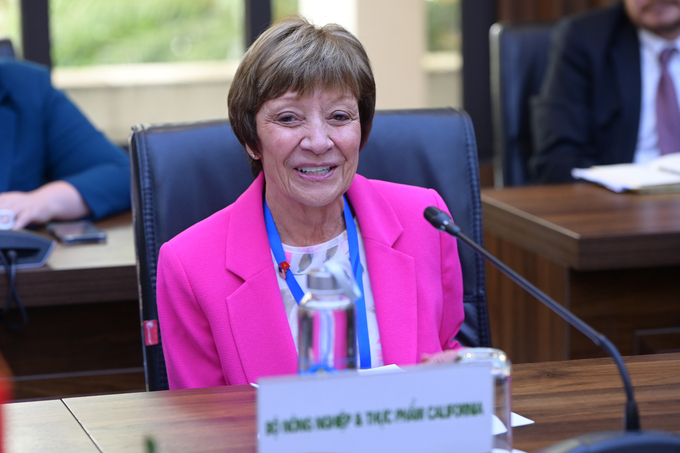
Karen Ross is serving as the Secretary of the California Department of Food and Agriculture (CFDA). Photo: Tung Dinh.
VAN: Can you share about the diversity of farming in California, especially considering the large Asian-American population in the state?
Secretary Ross: California has a broad diversity of farmers, representing a wide range of farm sizes and crops. Notably, we have a strong community of Asian farmers who specialize in growing fresh vegetables and berries. For instance, in the Fresno area, many of these farmers focus on cultivating fresh produce for Asian and Chinese markets in cities like San Francisco. This diversity extends beyond just the types of farms — it also includes the unique crops that cater specifically to the needs of these communities.
What’s particularly exciting is the availability of specialty crops like lemongrass and other ingredients essential to Vietnamese cuisine, which are increasingly popular among Californians. Many of us love enjoying Vietnamese food, whether dining out or cooking at home, and it’s fantastic to have easy access to authentic ingredients at local farmers' markets and grocery stores.
VAN: The recent discussions between the CDFA and Vietnam’s MARD in May 2024 highlighted collaboration on climate-smart agriculture, low-emission production processes, organic farming, food safety, and agricultural mechanization. How do you see the goals of these two ministries aligning?
Secretary Ross: The collaboration is multi-faceted, starting with a government-to-government approach that focuses on exchanging information about policy, priorities, and regulations.
This includes discussions on how we craft and enforce rules, with technical experts from MARD often visiting California to observe our laboratories and learn about our plant quarantine procedures and food safety testing methods. These exchanges are crucial for understanding each other’s regulatory frameworks and improving enforcement practices.
On the policy front, there’s mutual interest in climate-smart strategies, such as achieving carbon neutrality goals, reducing water usage, and enhancing fertilizer efficiency. It’s vital for both of our agricultural sectors to play a role in combating climate change, and how we see farmers being a part of the solution for climate change is very important.
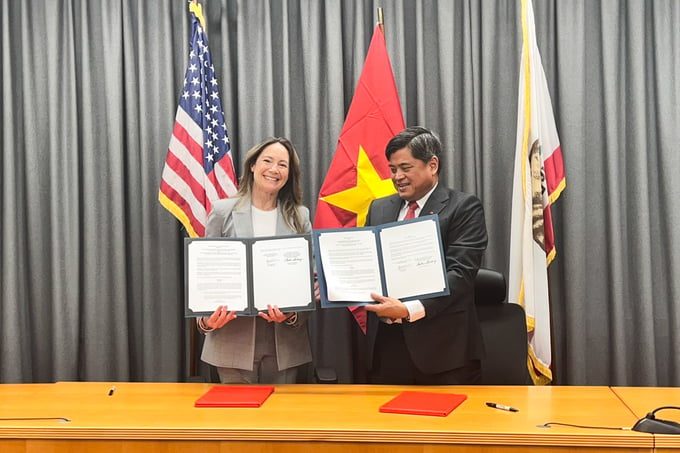
The MARD and the CDFA signed an agreement to promote sustainable, smart agricultural production that adapts to climate change in May 2023. Photo: ICD .
We also have strong academic partnerships, particularly with our land-grant universities. The University of California, for example, has hosted numerous Cochrane Fellows – a prestigious program that brings young academics from both countries together to exchange knowledge. These fellowships often lead to long-term research collaborations, enriching academic careers and strengthening bilateral ties.
I like to think of these efforts as planting “deep seeds.” We’re investing in relationships that grow over time. We have a significant number of students from Vietnam and Southeast Asia studying at our universities, who serve as cultural and academic ambassadors. They not only help us appreciate Vietnamese cuisine but also return home to become the next generation of business leaders in Vietnam, further strengthening the connection between our countries.
VAN: What about the consumer demand for tropical fruits in California?
Secretary Ross: Dragon fruit has become very popular in California, but it wasn’t always this way. Initially, many consumers were unfamiliar with it, often passing it by in the grocery store. Over time, though, dragon fruit has gained popularity and enjoys a growing export market to the United States, particularly in California. However, this market was significantly disrupted during COVID-19 and the accompanying supply chain issues, which affected many products that were previously doing well in California.
Based on the discussions I had this morning, the next priorities for the Vietnamese government include expanding the market for passion fruit, guava, and jackfruit. Introducing these fruits to consumers who may not be familiar with them is a step-by-step process—it starts with getting a foot in the door, followed by opportunities for consumers to taste, learn about, and eventually enjoy these fruits. This kind of exchange offers huge opportunities for both countries.
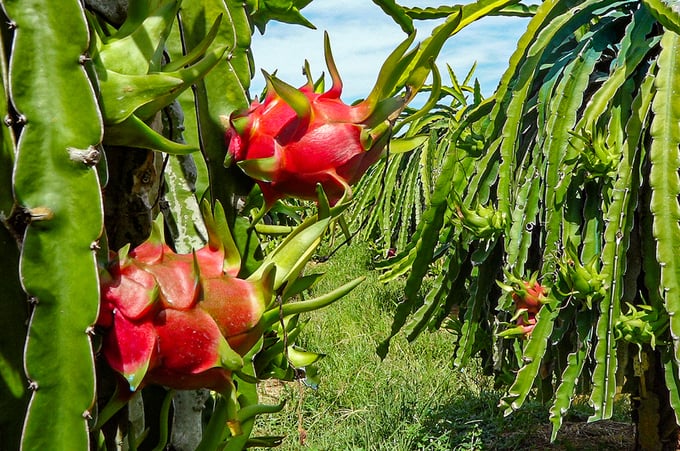
Dragon fruit has become very popular in California, posing opportunities for Vietnam's dragon fruit exporters.
VAN: California is a largely arid state, which has led Californian farmers to adopt high-tech solutions like drip irrigation. What do you think are the chances for Vietnamese farmers, who face drought and saltwater intrusion, to employ similar technologies?
Secretary Ross: Although we don’t conduct as many farmer-to-farmer exchanges as we used to, these exchanges remain an excellent way to share practical knowledge. Another effective avenue is through academic partnerships and cooperative extension programs. Additionally, large micro-irrigation companies, such as those from Israel, play a significant role in promoting these technologies globally. For instance, Netafim – a company we’ve collaborated with extensively, including visits to their kibbutz in Israel – has robust programs in Southeast Asia aimed at educating farmers on drip tape and micro-irrigation.
Implementing these technologies involves a learning curve, which is why technical assistance and demonstration projects are crucial. These initiatives help build the confidence of farmers, making it easier to adopt new practices on their own farms. The success of such projects is key to spreading these technologies throughout the farming community, helping farmers adapt to challenges of climate change.
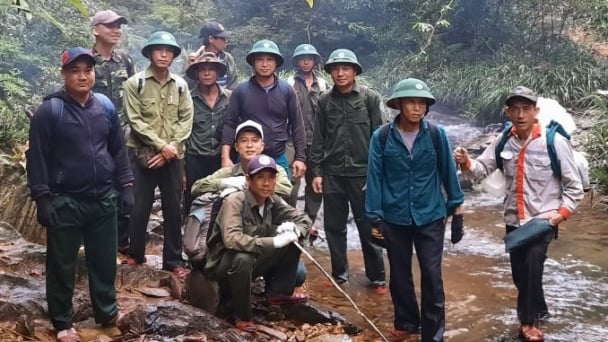
(VAN) All parties have acknowledged the barriers in mobilizing finance for conservation, proposing detailed initiatives. One of the most effective methods is to employ natural-based solutions.

(VAN) Vietnam is the country with the highest diversity of primate species in Southeast Asia, but most of them are seriously threatened, creating an urgent need for conservation efforts.
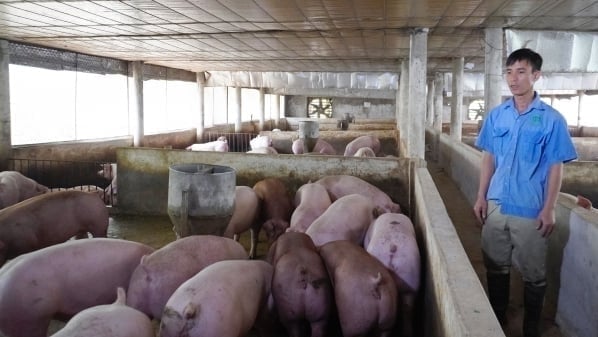
(VAN) Livestock farmers are still hesitant to use the new ASF vaccine products, mostly waiting for responses from large businesses before making a decision.
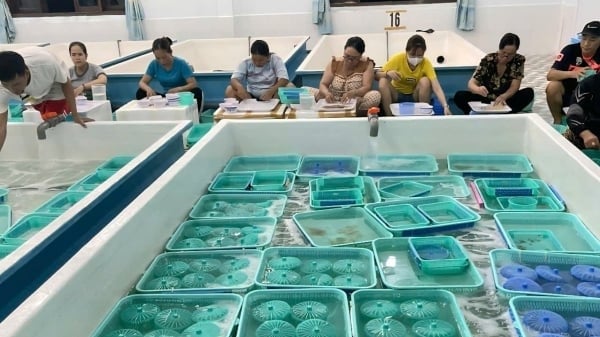
(VAN) Khanh Hoa and Phu Yen continue to strengthen inspection and control of lobster seed circulation in the area, and strictly handle violations.
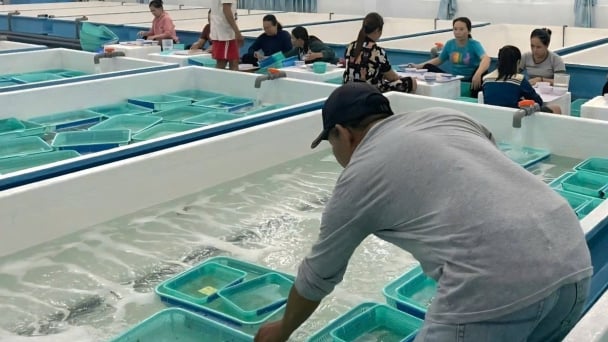
(VAN) Phu Yen and Khanh Hoa recently discovered many batches of lobster seeds of unknown origin. The authorities quickly moved and handled it as per regulations.
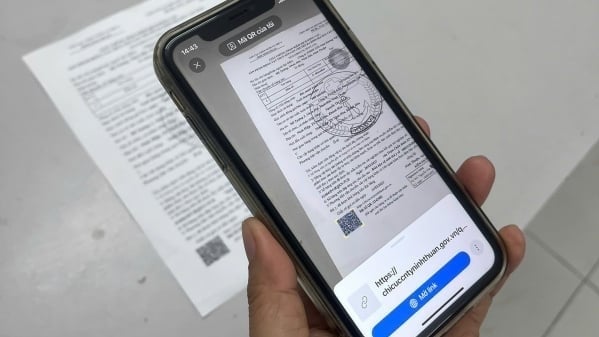
(VAN) Thanks to Ninh Thuans’s digitization of shrimp seed quarantine declarations, the procedures for payment and result reception are simpler and quicker.
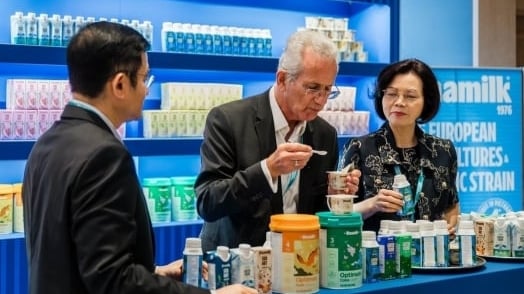
(VAN) In Amsterdam, the Netherlands, the 18th Global Dairy Congress 2025 took place from June 18-19, where Vinamilk won many grand awards.